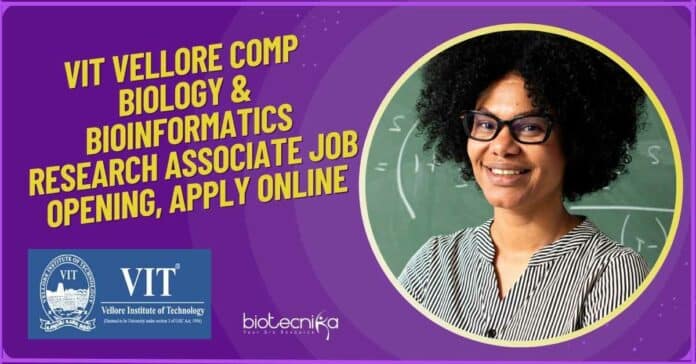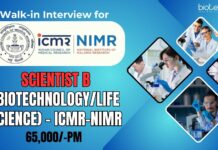VIT Vellore Comp Biology & Bioinformatics Research Associate Job Opening, Apply Online
VIT Vellore Comp Biology & Bioinformatics Research Associate Job Opening, Apply Online. PhD Bioinformatics and Computational Biology Research Associate vacancy is available at the Vellore Institute of Technology. Interested and eligible applicants can check out all of the details on the same below
Hey there, if you are a PhD candidate with a Computational Biology or Bioinformatics background, then check out the possible interview questions and answers are below
This job expires in
Applications are invited for the post of Research Associate (RA) for the ICMR Funded Project in School of Bio Sciences and Technology (SBST), (Project ID: 2021-14908), Vellore Institute of Technology (VIT).
Name of the Post – Research Associate (RA)
No. of Posts – 01
Name of the Project – “Integrated webserver for real-time tracking of genomic evolution and anti-microbial resistance in Mycobacterium tuberculosis”
Sponsoring Agency – ICMR, India
Duration – 2 years
Name of the Principal Investigator – Dr. George Priya Doss C, Associate Professor, School of Bio Sciences and Technology, Vellore Institute of Technology (VIT), Vellore – 632 014, Tamil Nadu.
Location – VIT – Vellore, Tamil Nadu.
Qualification – Ph.D., in Computer Science//Bioinformatics/Computational biology
Desirable (if any) –
- Strong programming skills in Perl, C, C++, and R.
- Experience with machine learning and deep learning techniques especially natural language processing.
- Evidence of scientific productivity through publications in international journals.
- Excellent written and oral communication skills.
- Willingness to contribute to team projects
Stipend – Rs. 47000 p.m. + HRA (as per norms)
How to Apply –
- Send your resume along with relevant documents pertaining to the details of qualifications, scientific accomplishments, experience (if any) and latest passport size photo, etc. on or before (15/05/2023) through online http://careers.vit.ac.in.
- No TA and DA will be paid for appearing in the interview.
- Shortlisted candidates will be called for an interview at a later date, which will be intimated by email.
- The selected candidate will be expected to join at the earliest.SBST/ICMR/
Hey there, if you are a PhD candidate with a Computational Biology or Bioinformatics background, then check out the possible interview questions and answers are below
- What motivated you to apply for this Research Associate position and what experience do you bring to the role? Answer: As a Ph.D. holder in Computer Science/Bioinformatics/Computational biology, I have extensive experience in genomic analysis and data analysis using programming languages like Perl, C, C++, and R. I also have experience with machine learning and deep learning techniques, particularly natural language processing. In addition, I have published my research findings in international journals.
- Can you explain the importance of the “Integrated webserver for real-time tracking of genomic evolution and anti-microbial resistance in Mycobacterium tuberculosis” project? Answer: The “Integrated webserver for real-time tracking of genomic evolution and anti-microbial resistance in Mycobacterium tuberculosis” project is significant because it aims to create a webserver that can be used to track the genomic evolution of Mycobacterium tuberculosis, which is the bacterium that causes tuberculosis. The webserver will also be used to identify anti-microbial resistance in Mycobacterium tuberculosis, which is important for developing effective treatments for tuberculosis.
- How would you rate your proficiency in Perl, C, C++, and R, and can you give an example of a project you have completed using one of these programming languages? Answer: I consider myself proficient in Perl, C, C++, and R. An example of a project I have completed using one of these programming languages is a project I worked on where I developed a machine learning model using R to predict the likelihood of a patient developing a certain disease based on their medical history.
- How would you approach analyzing genomic data, and what tools or techniques would you use? Answer: To analyze genomic data, I would first ensure that the data is preprocessed to remove noise and errors. I would then use various bioinformatics tools like BLAST, Bowtie, and ClustalW to align and compare sequences. I would also use machine learning techniques to identify patterns in the data and make predictions. Finally, I would visualize the data using tools like Circos and ggplot2 to gain insights into the data.
- Can you tell us about a time when you faced a technical challenge while working on a project, and how did you overcome it? Answer: When working on a project where we had to analyze large amounts of genomic data, we encountered a challenge with the storage and processing of the data. To overcome this challenge, we optimized our code to make it more efficient and also used cloud-based computing to distribute the processing of the data across multiple servers. This approach helped us to complete the analysis in a timely manner while still obtaining accurate results.
Editor’s Note: VIT Vellore Comp Biology & Bioinformatics Research Associate Job Opening, Apply Online. Please ensure that you are subscribed to the Biotecnika Times Newsletter and our YouTube channel to be notified of the latest industry news. Follow us on social media like Twitter, Telegram, Facebook





































